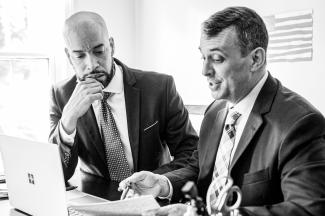
Jason Howell, CFP®, CPWA®, CSRIC® (left) and Doug Tees, MBA, CFP® (right)
Letter to Stakeholders, July 2022
You can read or LISTEN below.
Friday, July 8, 1:36 pm EST. We’re finally done with the first half of 2022. Good riddance. As you may have heard – and may have seen reflected in your portfolio – the financial market declines in the first half of this year have been historic. Stocks haven’t fallen this fast to start a calendar year since 1970. Bonds have never fallen this much (-10%+) to start a year. So what’s a long term investor to do? Try to understand what’s happening.
What is Happening
A big part of what we try to do in these “letters” is to translate what’s happening in the global economy and how it affects you. We also foreshadow what we plan to do. This year so far, both stocks and bonds are down. Rebalancing your portfolio does nothing in this scenario. Instead, we are analyzing this rare occurrence so we can be ready to make trades at an opportune time.
At the beginning of the year, stock “traders” rightly predicted that commodities – specifically, energy related oil companies – were the place to invest. At one point the broad market was down (-18%) while the XLE ETF – made of mostly Exxon and Chevron stock – was up (+40%)! We invest your portfolio without fossil fuels so (short-term) this made our strategy look pretty bad. Then over this past month, commodities – including energy – have plummeted. That same XLE ETF specifically has gone down (-23%)! The stock market gives and takes away which reinforces why we don’t try to “chase returns.”
Over the past few trading days, the stock market has been “up” about 4% (compared to being down 20%) for the year. The good news is you have recaptured one-fifth of this year’s losses in this month’s first 7 days. It can happen that fast. This is also why we keep you invested (rather than trying to “time in and out” of the market). The bad news is you might have to see more ebbs and flows (volatility) before your account can predictably march back up.
Why More “Volatility”
Before last Fall, the average stock price of the largest 500 companies in the stock market compared to their earnings was historically high. This comparison of stock price to company earnings is put into a ratio called the Cyclically Adjusted Price Earnings (CAPE) ratio. The higher this number above the average (about 16), the higher the likelihood the stock market will fall down to its average. At the end of 2021, the CAPE was about 38 and now it’s about 30. 30 is lower than 38 but higher than the average of 16. Does that mean the stock market must go down to its average this year? Probably not. But over the next few weeks more companies will report their earnings and based on those numbers, the market will react.
Recession
Last month’s Letter to Stakeholders detailed how even the inventor of the Gross Domestic Product (GDP) indicator believed it was a terrible way to measure overall economic wellness. The word “recession” regardless, is typically measured by two negative 3-month periods (quarters) of GDP. There is a real-time debate by economists about whether we will have a recession, how big it could be and when it will start. Remember that your wellness is not determined by short-term swings of GDP. In the long run, neither is your retirement.
If all this sounds interesting but confusing, well take comfort. This article explains why being confused about this year’s economy puts you in good company: The Atlantic.
Stakeholder Spotlight
Today’s spotlight is on Change Finance’s President and COO, Dorrit Lowsen. Earlier this week, Dorrit took some time to explain how her fund is leading the fight against policies that restrict reproductive health. Last month’s Supreme Court ruling that reversed the 1973 Roe v. Wade decision has provided many businesses with new, difficult decisions. Employees, customers and investors are asking corporate leaders to express their opinion on an issue where they know some will disagree. How does the role of finance participate in this conversation?
Dorrit explained in detail the role of corporate engagement and “proxy voting” that more often than not, can tilt the balance for how our corporate leaders make decisions. As an investor who enjoys the benefit of applying environmental, social and governance (ESG) factors, you will enjoy hearing how the system works. Watch/Listen to the discussion here.
Have a meaningful day,
Jason J. Howell, CFP®, CPWA®, CSRIC®
President
Jason Howell Company is an independent, family wealth management firm run by two owners who believe you should feel good about money.
Jason J. Howell, CFP®, CPWA®, CSRIC® and Douglas W. Tees, MBA, CFP® are each married to patient wives and are dedicated to their kids. Jason and Doug have built a firm with a great reputation. The firm is based in Northern Virginia but serves clients (virtually) all throughout the United States.
Our clients are “first generation wealth” and can feel guilty about how much they make and how much they spend compared to how they grew up. They are also concerned about how their wealth affects their sibling relationships and their kids.
We facilitate feeling "good about your money" in three ways:
- Family Governance: We walk the principles through a process that gets them talking about what it was like to grow up with money, how they pay bills and save today and what they want their family legacy to sound like. This turns into a “Family constitution.”
- Sustainable Investing: We match the values derived from the “Family Constitution” to a sustainable investing strategy that incorporates an adaptive efficient market theory with environmental, social and governance factors
- Proactive Philanthropy: Many of our clients will have a little extra, even after they achieve their family’s personal goals. We show them how much they can afford to be giving while living to the people and causes they care about
To feel good about your money, just book an introductory call here: Introductory Call

